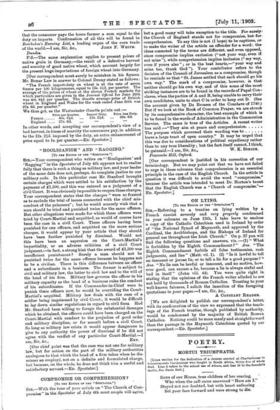COMPROMISE OR COMPREHENSION P
[To THE EDITOR OP THE " SPECTATOR."'
Sin,—With the tone of your article on " The Church of Com- promise" in the Spectator of July 4th most people will agiee. but a good many will take exception to the title. For surely: the Church of England stands not for compromise, but for
comprehension. To say this is not (I hope) to be captious, or to make the writer of the article an offender for a word: the ideas connoted by the terms are different, and even opposed, since compromise implies exclusion (" not your way, even if not mine "), while comprehension implies inclusion (" my way, even if yours also" ; or in the best hearts,—"your way and mine too, thank God "). Your contributor refers to the decision of the Council of Jerusalem as a compromise, though he reminds us that "St. James settled that each should go his own way." The mark of a compromise, however, is that neither should go his own way, and of this some of the most striking instances are to be found in the records of Papal Con- claves, when the parties of A and B, being unable to carry their own candidates, unite to elect C in order to keep out D. (See the account given by De Brosses of the Conclave of 1740.) But if we look at the Book of Common Prayer, we are struck by its comprehensive character, the best example of which is to be found in the words of Administration in the Communion Service. The same is true of the Articles. A recent writer
has said :—" They aim at peace and comprehension The purpose which governed their wording was to
leave a large tract of open country." It may be urged that this was due to considerations of political expediency rather than to any true liberality ; but the fact itself cannot, I think, [Our correspondent is justified in his correction of our terminology. But we may point out that we have not failed to urge in these columns that comprehension is an essential principle in the case of the English Church. In the article in question it was difficult to avoid the word " compromise," because the article was intended to meet Dr. Horton's taunt that the English Church was a " Church of compromise."—* ED. Spectator.]






































 Previous page
Previous page